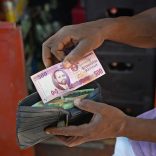Mozambique: Savings deposits grow 15% in one year
Mozambique: Centre for Public Integrity warns of ‘frightening’ $2B China debt

in file CoM
Mozambique’s Centre for Public Integrity (CIP) on Tuesday described the country’s debt to China as “frightening” as well as lacking in transparency, calling on the government to explain how it will manage the burden, at a time when its scope for action is being limited by the effects of the Covid-19 pandemic.
The CIP, a non-governmental organisation that works to unmask corruption and increase transparency in public life, analysed the impact of Chinese debt on Mozambique’s public accounts, in a document that highlights the way that it is set to affect the availability of resources in the budget to confront the pandemic.
Mozambique has had 10,258 confirmed cases of the new coronavirus that causes Covid-19, with 73 deaths associated with the disease, and 7,880 recoveries.
In its conclusions, the CIP report notes that the country owed China some $2 billion (€1.7 billion) at the end of 2019, describing that figure as “frightening” and “similar to the hidden debts” taken on by public enterprises in 2013 and 2014 and which were secretly underwritten by the previous government, triggering a financial and economic crisis in the country.
The cost of servicing the China debt, the report states, “is capable of causing large diversions of funds needed by social sectors, especially in the current context of the covid-19 pandemic.” It stresses that the government “should clarify to Mozambicans how it will repay this debt and present in detail the projects that constitute the debt.”
This explanation is particularly necessary, it argues, given that the seven-year term of the debt is nearing its end.
“To show transparency regarding these loans is urgent, at a time when Mozambicans have to face the new coronavirus, which implies the government using the few resources available in order to protect to the utmost the health and well-being of Mozambicans.”
The CIP criticises the fact that the government’s reports on the public debt do not include information on the interest and repayments on the China debt, “which represents a weakness for a document which in general has a rich content”.
The organisation notes that Mozambique had borrowed money from China before 2010 but that much more was taken on in 2016, mainly from the Export-Import Bank of China.
“It is worth emphasising that one of the reasons why debts with China continued to grow after 2016, the year in which the hidden debts [emerged], was because the members of the Paris Club practically refused to give new credits to Mozambique,” the document states – referring to the group of major creditor countries that seeks co-ordinated, sustainable solutions to the debt of less-developed countries.
The money borrowed from China, the text notes, was used to finance large-scale infrastructure investment projects, mostly of a commercial or administrative nature.
“One element that has certainly influenced this growth in debt with China is that it applies less strict criteria for granting new loans,” it states.
Mozambique’s “high level of debt” exposes the country to the risk of becoming financially dependent on China, which in turn could result in “enormous pressure on the Mozambican government” as it risks “a possible debt trap”.
According to the CIP, the China debt also exposes Mozambique to foreign exchange risks, as the debt is denominated in dollars, making it vulnerable to swings in exchange rates.
In a comment to Lusa, Agostinho Mondlane, an economist at the Centre for Democracy and Development (CDD), another NGO in Mozambique, described the China debt contracts as characterised by “opacity and no public information on the terms and conditions under which the debts should be written off.
“In the absence of information on the terms and conditions of these debts, it is not even known which collaterals are attached to these debts, nor whether they are concessional or commercial”, Mondlane said.
At the same time, some of the infrastructure financed with the money from China is of dubious economic return, because no due diligence was done to ensure consistent feasibility studies.
“Unfortunately, part of that money finances veritable white elephants, which then burden the public purse of debtor countries,” Mondlane warned.
A source from China’s embassy in Maputo said that his government would not publicly discuss the content of its debt agreements with Mozambique, refusing to go into details on the issue.
On the risk of possible non-compliance on the part of Mozambique, possibly leading the Chinese authorities to seize public goods, Mondlane was sceptical about this scenario, arguing that there is always scope to restructure the debt.
“It does not seem logical to me that China would prefer to kill the goose that lays the golden eggs,” he said.












Leave a Reply
Be the First to Comment!
You must be logged in to post a comment.
You must be logged in to post a comment.